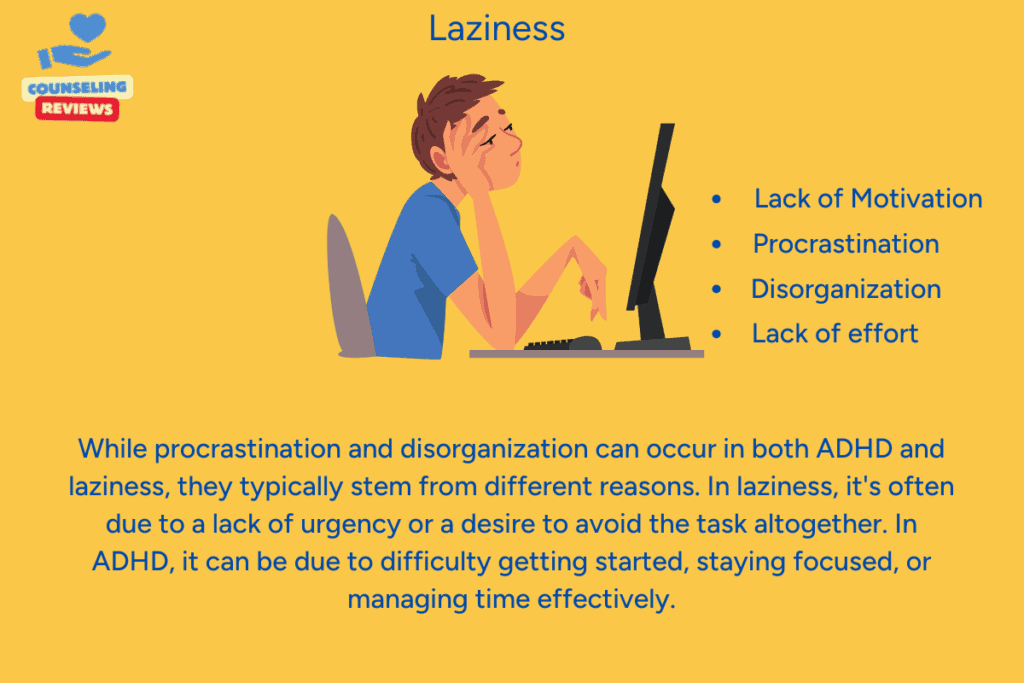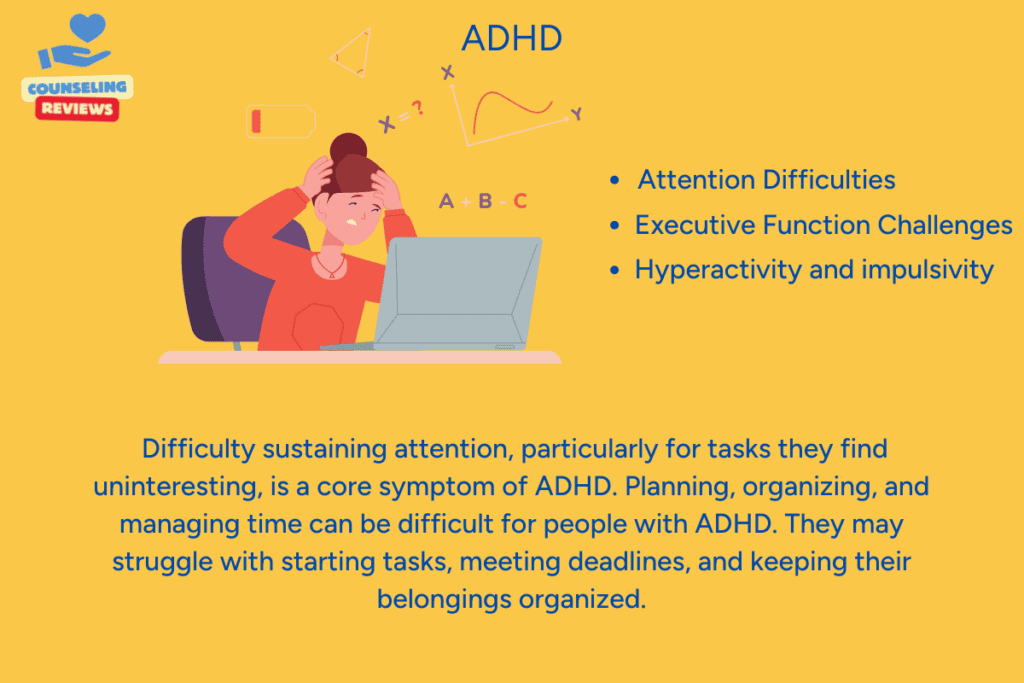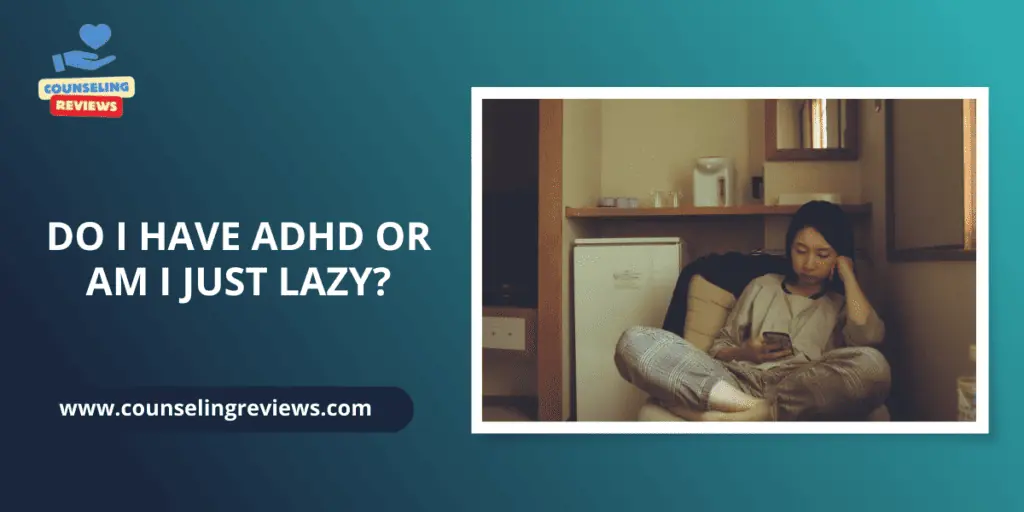Sometimes, people who are struggling with a mental health disorder may be labeled as “lazy,” because symptoms can interfere with daily functioning. Attention-deficit/hyperactivity disorder (ADHD) is one mental health condition that can make a person seem lazy. In reality, people with ADHD are struggling with symptoms related to this mental health condition. Below, learn how to distinguish between ADHD and laziness.
Distinguishing Between ADHD and Laziness
All too often, I have heard people call themselves “lazy” when they are actually struggling with symptoms related to ADHD or another mental health disorder.
ADHD is a neurodevelopmental disorder that leads to difficulty with remaining focused and controlling impulses. People with ADHD may also struggle with hyperactive behavior. ADHD is a chronic condition, and it can negatively impact several areas of life, including school, work, relationships, and daily functioning.

Symptoms of ADHD may appear like laziness to some, but they are actually a manifestation of this neurodevelopmental disorder. ADHD is associated with deficits in executive functioning, which are high-level cognitive processes. These processes include self-control, planning, task prioritization, and working memory. I think it’s important for people to understand that when someone struggles with executive functioning deficits, they aren’t being lazy. Their brain is truly working against them.
Because people with ADHD have difficulty with executive functioning, it can be challenging for them to begin new tasks, and they may engage in procrastination. A person with ADHD may have a hard time controlling their impulses or regulating their behavior, so instead of doing the things they need to do, they may put them off or simply do nothing.

While this behavior can appear like laziness, it is really just an example of the executive dysfunction that occurs with ADHD. The difference between ADHD vs. laziness is that lazy behavior tends to be occasional. For instance, if you sometimes put off tasks or spend a little too much time relaxing, you might be showing signs of laziness. However, if you frequently struggle to see tasks through to completion, it’s more likely to be a symptom of ADHD. Since ADHD is a chronic disorder, behaviors will be consistent and long-lasting.
Keep in mind that even if you aren’t experiencing symptoms of ADHD, laziness may not be a character flaw. People sometimes use the word “lazy” as an insult when someone struggles to fulfill their duties. While it can sometimes be appropriate, in many cases, a person who appears lazy may be struggling internally. For example, depression leads to a loss of interest in usual activities, so a person may appear lazy when in reality they are so depressed that they do not have the drive to participate in usual tasks.
Common Signs of ADHD
If you feel like you’re just lazy, it’s important to understand the common signs of ADHD. What appears like laziness could actually be a manifestation of ADHD, especially if you show typical ADHD symptoms.
ADHD symptoms can be divided into two groups: symptoms of inattention and symptoms of impulsivity/hyperactivity. Inattentive symptoms include:
- Difficulty paying attention to details
- Having a tendency to make careless mistakes at work or school
- Struggling to see tasks through to completion
- Difficulty listening when spoken to
- Finding it challenging to be organized (ie: missing deadlines, struggling with time management)
- Avoiding tasks that are mentally taxing
- Losing important items, such as keys, school books, or a wallet
- Easily becoming distracted
- Forgetting to complete tasks such as chores, errands, or paying bills
Symptoms of hyperactivity/impulsivity include:
- Frequent fidgeting or squirming
- Struggling to stay seated
- Running and climbing when it’s not appropriate to do so
- Being unable to relax or play quietly
- Talking excessively
- Appearing to be always “on the move”
- Having a hard time waiting in line
- Blurting out answers to questions or interrupting others’ conversations
Some people show only one subtype of ADHD, whereas others are both inattentive and hyperactive/impulsive. Regardless of the specific symptoms you experience, if you show some or many of the signs above, laziness is probably a side effect of ADHD.
Understanding Procrastination and Laziness
ADHD, procrastination, and laziness are side effects of this mental health condition. ADHD is associated with difficulty seeing tasks through to completion, as well as avoidance of mentally taxing activities. So, instead of beginning a task on time and working until it is finished, a person with ADHD may procrastinate the task until the last minute, or avoid it altogether.
Because ADHD is associated with executive functioning deficits, it can be challenging for a person with ADHD to engage in goal-directed behavior. Certainly, we all struggle with procrastination from time to time, and sometimes, we simply don’t want to do a difficult task. However, ADHD can be quite debilitating, making it even more challenging for people to complete tasks as assigned.
Seeking Professional Assessment for ADHD
If you have common ADHD symptoms, such as difficulty concentrating, becoming easily distracted, and having a hard time waiting your turn, it’s time to seek professional intervention. A mental health professional, such as a psychologist, psychiatrist, or clinical social worker, can perform a diagnostic assessment. If you meet diagnostic criteria for ADHD, they can develop a treatment plan to help you manage this mental health disorder.
ADHD is often treated with stimulant medication, so you may need a referral to a medical doctor who can prescribe medication. These medications can make ADHD symptoms more manageable. You may also benefit from counseling or therapy to help you develop healthy coping strategies and learn ways to improve your focus.
Strategies for Managing ADHD and Laziness
If you are experiencing symptoms of ADHD, and you’re struggling with behaviors that most people consider laziness, there are steps you can take to manage your behavior. Consider the following strategies:
- Set reminders for appointments and due dates on your phone.
- Block out chunks of time to work on important tasks and assignments.
- When you’re working on a mentally taxing project, give yourself frequent breaks.
- Find a quiet space for working to limit distractions.
- Reward yourself with small treats when you complete a chore or unpleasant task.
ADHD is a chronic mental health condition, and it can be debilitating. However, you can learn strategies to manage it. If you’re struggling with ADHD symptoms, you may benefit from online therapy. Connecting with a therapist from the safety and comfort of home can make it easier to receive professional support.





